Interview with Dirk Helbing, Chair of Sociology, ETH Zürich, Switzerland
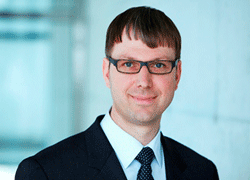 Prof.Dr. Dirk Helbing, Chair of Sociology, in particular of Modeling and Simulation, at ETH Zürich, the Swiss Federal Institute of Technology Zurich (in German: Eidgenössische Technische Hochschule Zürich), Switzerland
Prof.Dr. Dirk Helbing, Chair of Sociology, in particular of Modeling and Simulation, at ETH Zürich, the Swiss Federal Institute of Technology Zurich (in German: Eidgenössische Technische Hochschule Zürich), Switzerland
1. As Scientific Coordinator, you are one of the main driving forces behind FuturICT, one of Europe’s Future and Emerging Technologies (FET) Flagship Pilot research initiatives. This is one of the most ambitious, comprehensive, timely and revolutionary scientific efforts ever attempted. In the context of the communication and socio-economic challenges faced by humanity in the 21st Century, what can you highlight about the visionary goals of this enterprise?
Humanity has invested billions to reveal the forces of nature using large particle colliders. Today, we can send men to the moon, but financial crises, terrorism, global environmental change and other problems suggest that we need to pay more attention to what is happening on Earth.
The majority of pressing problems in our world, such as economic instability, wars and disease spreading, are related to human behaviour and the dense interconnectedness of our society. Human knowledge of how society and the economy work, however, has serious gaps. We also do not truly understand the relationship between society and the globally pervasive technological system connecting us. It is imperative that we prioritise closing these knowledge gaps, to help us mitigate future crises.
To achieve this, we believe that a large-scale scientific effort such as FuturICT is needed to bring the top researchers from the social, computational, natural, and engineering sciences together. By combining expertise from across these fields, we hope to open up the doors to a new understanding of society’s behaviour, and how we can best manage our connected social and technological world in a sustainable manner.
2. Some of the objectives stated by FuturICT seem to belong to the realm of science fiction for the everyman, what concrete examples resulting from FuturICT can you give of real life developments to be experienced by the lay user? Broadly, what are the specific societal and economic leverage effects pursued by FuturICT?
This project is indeed unprecedented. But it has already succeeded in uniting researchers across a wide range of disciplines to work together towards this ambitious goal, and therefore has the potential to make advances which have not been possible before.
We are planning to create interconnected Observatories to explore possible crises and opportunities relating to our financial and economic system, the social system, health, environment, and so on. These observatories will, for example, detect advance warning signs by mining large amounts of system-relevant data. They will allow citizens and policy makers to explore policy options and their possible impacts, including undesirable side effects that should be avoided. We believe that, in many cases, systemic crises could be prevented or mitigated if our responses were quicker and we had the right technologies to support the assessment of complex systems with their often counter-intuitive behavior.
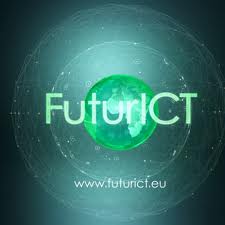 In the past, we have been quite successful in developing new approaches to avoid crowd disasters, for example. We are confident that we will be able to identify impending conflicts, make short-term forecasts for disease spreading (based on recent discoveries in network theory), contribute to a more resilient financial architecture, and create more sustainable system designs – all for the benefit of the average person.
In the past, we have been quite successful in developing new approaches to avoid crowd disasters, for example. We are confident that we will be able to identify impending conflicts, make short-term forecasts for disease spreading (based on recent discoveries in network theory), contribute to a more resilient financial architecture, and create more sustainable system designs – all for the benefit of the average person.
FuturICT will also create new socio-inspired information and communication systems and participatory platforms. Everybody will be able to benefit from these new technologies (in a similar way as most people are using the internet and mobile phones today). The economic potential of these innovations can be estimated by looking at the huge value of social networking companies.
3. This project would attempt to build a planetary scale supercomputer to be known as “Living Earth Platform”. What would be the workings and functions of such a device and how would its operation impact on key social concepts currently associated with the Internet, such as pervasive and ubiquitous access to and exchange of information?
FuturICT plans to do the following: Just like the CERN, which studies the forces that keep our physical world together, the FuturICT Knowledge Accelerator will study the principles that keep a social system together. This will be crucial also for the proper design of future ICT systems, as they are socially interactive systems as well: they are made up of billions of interacting, intelligent, and partially autonomously acting components (such as computers, smartphones, their users, etc.). Since our society has become largely dependent on ICT systems, their stability and reliability has become absolutely crucial - but is not at all guaranteed in the way they are currently designed. In fact, it is known that increasing the density of networking can destabilize systems requiring cooperative behavior. Systemic breakdowns, cybercrime and cyberwar are problems that have become virulent indeed. At the same time, social features such as self-organization, adaptiveness, emergent cooperation, social norms, cultures and community formation are attractive features for ICT systems. "Trust" is just one example of a hardly understood, but crucial property of social systems - and ICT systems as well.
FuturICT will, therefore, create sustainable, socio-inspired technologies - ICT systems that self-organize and socially adapt to users, their respective contexts, and to individual and collective needs. It will create a Living Earth Platform, which includes mainly three levels: the techno-socio-economic "flight simulator" (also called "Living Earth Simulator"), a “Planetary Nervous System”, and a Global Participatory Platform. The simulator will require the development of interactive decentralized supercomputing that scales up to global-level systems and allows one to study the impact of different possible decisions, i.e. to explore various future scenarios at different degrees of detail, employing a variety of perspectives and methods (such as agent-based simulations, where agents are sophisticated and equipped with cognitive features). This requires us to establish a World of Modeling - an open platform comparable to an app-store, where scientists and developers can provide theoretically informed and empirically validated modeling components that map parts of our real world. It also needs a coupling with huge amounts of data, which will become available by integrating various data sources coming from online surveys, web and lab experiments, and from large-scale data mining.
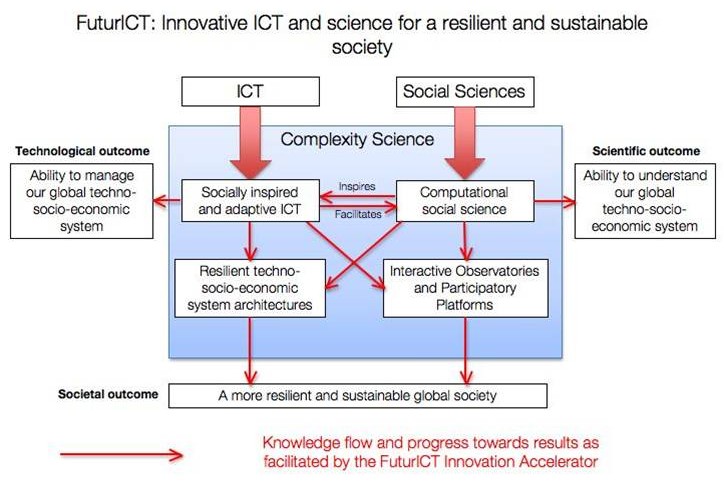
This is, where the Planetary Nervous System comes in - and the need for a new data science, a "social information theory" that allows us to understand when and how new knowledge is created from existing pieces of information. The Planetary Nervous System can be imagined as a global sensor network, where sensors mean everything that provides data about techno-socio-economic-environmental systems in real-time (including the internet).
The massive amounts of data produced will also enable one to calibrate and validate models of techno-socio-economic systems, and even to extract suitable models in a data-driven way, guided by theoretical knowledge. Note, however, that FuturICT is not interested in tracking individual behavior. It rather wants to understand the macroscopic interdependencies resulting from social interactions. In fact, FuturICT will promote the development of a trusted web and of privacy-respecting data mining technologies that give users back control over their data. FuturICT wants to benefit society and not control it. Therefore, FuturICT will also have a strong research focus on ethical issues, and it is committed to informing the public about the use of socio-economic data and to counter-acting misuse of data and ICT.
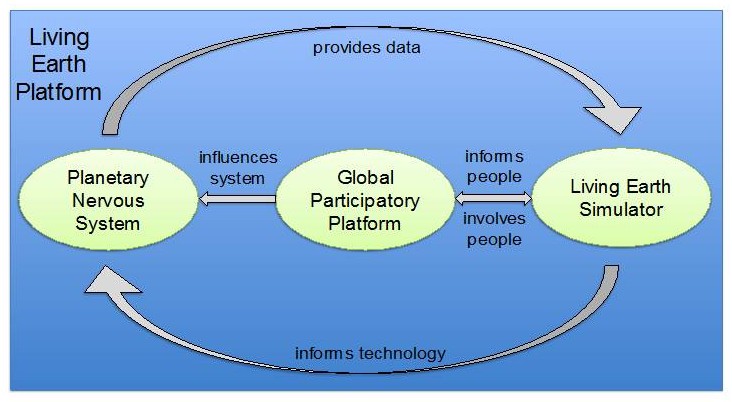
Furthermore, FuturICT will build a Global Participatory Platform that promotes the communication, coordination, cooperation of people, and their social, economic and political participation beyond what eGovernance platforms offer today. In fact, FuturICT will create opportunities to reduce the strict separation between users and providers, customers and producers etc., facilitating a participation in industrial and social value generation chains. Leveraging Wikipedia's success principle, FuturICT will help societies to use the knowledge and creativity of multiple minds much better than we can do it today. The Participatory Platform will also craft populated virtual worlds very much alike our real world, but with the possibility to create variants of them. In other words, through serious multi-player online games, we will be able to explore possible futures - not only different designs of shopping malls, airports, or city centers, but also different financial architectures or voting systems.
4. Within the main project, what is the role of work package 3 “Designing an Innovation Accelerator” for which you are responsible?
The Innovation Accelerator will develop methods to support the collaboration in large-scale projects, i.e., many experts distributed across different regions and disciplines working towards one joint goal. In this way, we are addressing one of the key challenges of forming a successful Flagship project head on.
Specifically, we will pursue new approaches to support the communication and flexible coordination in large-scale projects, co-creation and quality assessment. We will also develop new methods to identify new trends and innovations early on. We expect these methods to be of great value in the business world too.
The umbrella concept of the whole FuturICT project is that of the Knowledge Accelerator. By bringing leaders from the social, computational, natural, and engineering sciences together in order to work towards a common goal, we aim to vastly accelerate progress in our ability to understand socially interactive systems and how to manage them in a resilient and sustainable way.
5. Do you believe that science is the answer to the pressing need to find a solution to the challenges threatening the sustainability of life on Earth?
Designing sustainable systems and better understanding the interaction in and between technological, social, economic and environmental systems is certainly very pressing.
We have made vast progress in our understanding of our physical world. Extensive mathematical models describe its operation in exquisite detail. Such scientific understanding has advanced our ability to create new technology to improve our day-to-day lives.
In turn, the FuturICT project will provide us with novel and powerful tools to address , social, economic, environmental and health-related issues that humanity faces. A better understanding of the hidden laws and processes underlying societies will certainly enable us to find better solution approaches.
6. The concept of Internet Science is characterized by its multi-disciplinary nature (going beyond computer science and engineering to include scientific expertise from economics, sociology, physics, biology, psychology, etc.) and scale (e.g., dealing not with one node but million/billion nodes). How does the topic of Institute IMDEA Networks’ 3rd Annual International Workshop: Internet Science in which you were participating, fall within the scope of the FuturICT Flagship endeavour?
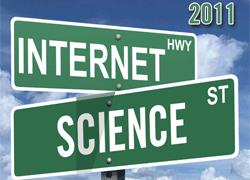 The Internet plays a central role in our project, both as basis for the Global Participatory Platform we are planning to create and also to provide us with data that help us understand socio-economic activities and their interdependencies on a macroscopic scale.
The Internet plays a central role in our project, both as basis for the Global Participatory Platform we are planning to create and also to provide us with data that help us understand socio-economic activities and their interdependencies on a macroscopic scale.
In fact, the Web is becoming an increasingly rich data repository. Part of the drive for this project is to maximise the usefulness of these data for society as a whole. Industry is already making use of big data to inform business strategies and increase profits. FuturICT will examine how these data can be utilised to address problems that society faces as a whole, from economic, health and environmental crises, to determining which policy decisions will support us most in moving towards a more sustainable and resilient society. The FuturICT project will seek to better understand the relationship between society and the technological systems which connect us and pervade our world. This will help us design more resilient systems, less likely to cause societal crises through sudden failure or other unexpected behaviour.
Note that FuturICT is not interested in tracking individual behavior. It rather wants to understand the macroscopic interdependencies resulting from social interactions. In fact, FuturICT will promote the development of a trusted web and of privacy-respecting data mining technologies that give users back control over their data. FuturICT wants to benefit society and not control it. Therefore, FuturICT will also have a strong research focus on ethical issues, and it is committed to informing the public about the use of socio-economic data and to counter-acting misuse of data and ICT.
7. What is your vision for exciting future research in this area?
Our vision is multi-faceted. On a scientific front, the large amounts of data now becoming available from a wide range of sources mean that we are finally in a position to vastly increase our understanding of the principles which underlie society’s behaviour. On a policy front, we will develop ground breaking tools for detecting warning signs of social crises, and exploring the possible outcomes of applying different policies. On the technology front, we will use our new understanding of society’s behaviour to create socio-inspired technologies with features such as self-organization, adaptiveness, emergent cooperation, social norms, cultures and community formation. Moreover, as pointed out before, we want to build a Planetary Nervous System. Such an infrastructure will allow one to do reality mining on a global scale and to measure the socio-economic-environmental footprint of human actions, i.e. to create a greater awareness of the possible implications of human decision-making. This will result in better tools to increase human well-being than the gross national product is today.
8. In your opinion, how has the Internet affected social life on Earth?
The Internet has had an unprecedented effect on information flow between members of our global society. It is of course now pervasive, with the proliferance of personal Internet-enabled devices, and the growing extent to which we are instrumenting everyday objects and connecting them to the Internet. Many of the core systems supporting society, such as our transport network, our power network, our financial system, are all fully reliant on technological connectivity.
In spite of this, one does not fully understand the relationship between our society and this globally connected technological system. FuturICT aims to increase our understanding of the ways in which failures in this system could cause problems for our society, and also to explore the opportunities arising from a greater understanding of society. This will allow us to create globally connected systems which are responsive and adaptive to society’s needs and resources, and which are resilient and sustainable.
Read more:
 Download press release (557KB)
Download press release (557KB)- Madridmasd – Entrevistas (in Spanish only)

